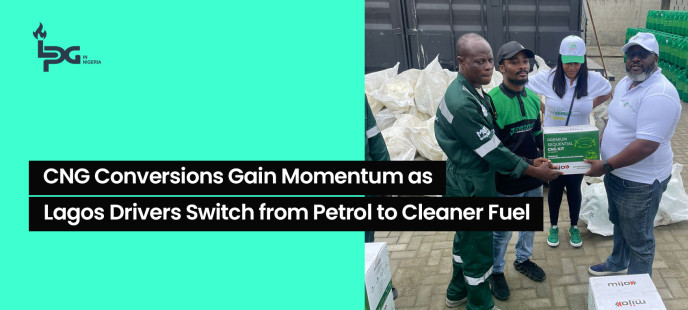- 3676
- 0
Sharing Ideas and Updates on LPG in Nigeria and related information to enable effective collaboration within the LPG Value Chain
CNG Conversions Gain Momentum As Lagos Drivers Switch From Petrol To Cleaner Fuel

Lagos is witnessing a wave of commercial drivers flocking to various centres across the state to convert their petrol-powered vehicles to compressed natural gas (CNG). With rising fuel costs, this initiative offers an affordable alternative, and drivers are seizing the opportunity to make the switch.
The conversion centres, spearheaded by the Presidential Compressed Natural Gas Initiative (PCNGi), have become a hub of activity. At the Portland Ojota Conversion Centre alone, over 30 vehicles were lined up, with drivers eager to take advantage of the CNG conversion, which promises lower fuel costs and a cleaner, more sustainable energy source. A second conversion centre was along Lekki Epe expressway way by Abraham Adesanya junction, by Libmort bus park. Yinka Rufai , Special Projects adviser for the President PCNGI was on the ground.
According to Michelle Ejiofor, the Chief Operating Officer at Portland Gas Limited, the conversion offers multiple benefits, including reduced emissions and lower transportation costs. “If we have a lot of mass transit vehicles being retrofitted with CNG, it means that it will lower the cost of food, transportation, and Nigerians will actually get to smile,” she explained. The initiative is set to have a significant impact on both drivers and passengers, helping to mitigate the economic pressures of fuel price hikes.
PCNGi is collaborating with Mezovest and others to provide the conversion kits, and the first 50 vehicles at each centre are being converted free of charge on a first-come, first-served basis. So far, 50 kits have been deployed to Lagos, and more are on the way as part of a larger plan to roll out 10,000 kits across Nigeria. The goal is to complete 10,000 vehicle conversions in the initial phase, covering states like Ogun, Oyo, Kaduna, Abuja, and Lagos. Also, PCNGI has the goal of rolling out 1m cylinders by 2027.
















0 Comment.